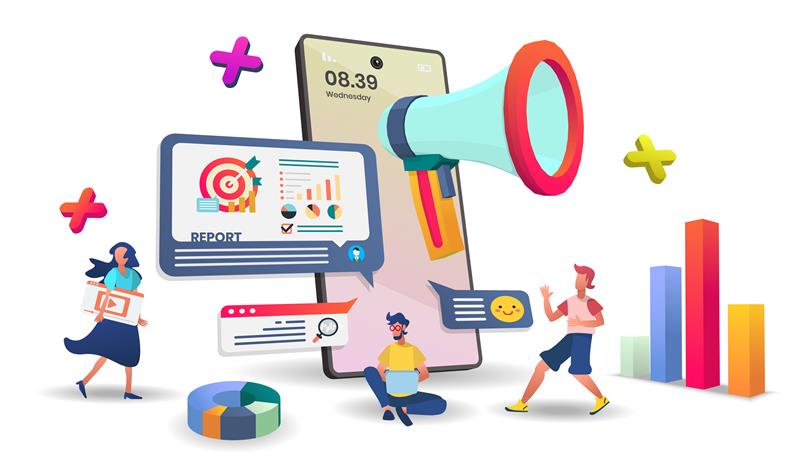Today, the world is hyperconnected and social media is no longer just a platform to stay in touch with friends. It is a powerhouse tool for branding and business via an effectivedigital marketing campaign strategy. From start-ups to multinational corporations, businesses leverage social media to connect with audiences, build brand awareness, drive engagement, and increase revenue. However, with the ever-evolving digital marketing landscape, simply ‘being on social media’ is not enough.
To truly harness the potential of social media in digital marketing, brands need creative, strategic, and data-driven approaches. In this blog, we will explore the most effective ways to use social media in digital marketing campaigns to get real, measurable results.
1. Define Clear Goals and KPIs
Well begun is half done, and you can begin your digital marketing campaign successfully by defining clear objectives. Having well-defined goals are foundational to your digital marketing campaign strategy, and will help boost brand visibility, drive website traffic, build a community, and increase sales.
Here are some Key Performance Indicators (KPIs) that you must keep an eye on:
- Engagement rate (likes, shares, comments)
- Click-through rate (CTR)
- Conversion rate
- Follower growth
- Customer acquisition cost (CAC)
It’s time for brands to start aligning their social media efforts with long- and short-term business goals to ensure measurable success.
2. Know Your Audience Inside Out
It is crucial for brands to understand their target audience to be able to run a successful digital marketing campaign. Even though there are extensive social media targeting options available, the best of content can fall flat if the brand doesn’t know it’s audience well.
Below listed are the tools that brands can use:
- Facebook Audience Insights
- Instagram analytics
- Twitter Analytics
- LinkedIn Demographics
Creating buyer personas can help brands target their content and messaging directly to the audience. They could customize the content in a way that it speaks their language, taps into their interests, and provides solutions that resonate with their needs.
3. Choose the Right Platforms
Choosing the right social media platform is the key to successful digital marketing campaign management. Not all social media platforms are the same. Each one is created to cater to different audiences via diverse content formats. Hence, it is important for brands to focus on platforms that align with their audience and goals.
- Facebook & Instagram: Great for B2C marketing, visual storytelling, and retargeting.
- LinkedIn: Ideal for B2B campaigns, thought leadership, and professional networking.
- Twitter (X): Effective for real-time updates, news, and customer service.
- TikTok: Perfect for engaging Gen Z with short, entertaining videos.
- Pinterest: Works well for lifestyle, fashion, DIY, and home decor brands.
Mastering a few key platforms often brings better results than trying to be active on every channel. If you want to be active on multiple platforms, pay heed to the diversity and differences of each one and cater to their particular audiences accordingly.
4. Create High-Quality, Engaging Content
Content is the heart of social media marketing. But with attention spans getting shorter with each passing day, the content needs to be catchy enough to stop the scroll. This means the content for your digital marketing campaign strategy should be:
- Visually appealing
- Emotionally resonant
- Informative or entertaining
- Tailored for each individual platform
Here is a mix of content types brands can use:
- Short-form videos (Reels, TikToks, Shorts)
- Carousels and infographics
- User-generated content
- Live videos
- Polls, quizzes, and interactive stories
Sharing a little pro tip for brands: Value-driven content that informs, educates, entertains, or inspires will naturally drive engagement and build loyalty.
5. Leverage Influencer Partnerships
Today, influencer marketing is rapidly becoming one of the most effective social media tactics. When campaign management in digital marketing is done right, influencers become one of the most effective means to help brands reach new audiences authentically.
Choosing the right influencers is the key. Select the ones who:
- Align with your brand values
- Have genuine engagement (not just vanity metrics)
- Cater to your target demographic
When planning out their digital marketing campaign strategy, is important for brands to understand the significance of micro-influencers (10K–100K followers). They often have stronger connections with their audiences and offer better ROI than mega-influencers.
6. Utilize Paid Social Advertising
Organic reach could be affected by multiple factors. Utilizing paid social media ads allows brands to stay up and running in the highly competitive arena. Paid campaigns can help:
- Amplify reach
- Retarget website visitors
- Promote lead magnets
- Drive conversions
Brands can utilize platforms like Facebook Ads Manager and LinkedIn Campaign Manager in their digital marketing campaign. These platforms offer detailed targeting based on location, interests, behaviour, job title, and more.
These are the best practices to be implemented for social ads:
- A/B test creative variations
- Use clear, compelling CTAs
- Optimize landing pages
- Monitor ad frequency to avoid fatigue
Paid ads, when aligned with a solid strategy and compelling creative, can supercharge your digital marketing campaigns.
7. Implement a Content Calendar
When it comes to social media, consistency is key. Preparing a content calendar helps maintain brand voice, streamline efforts, and ensure regular posting.
A social media digital marketing campaign content must be planned around the following:
- Around key dates (holidays, product launches)
- With a content mix strategy (80% value, 20% promotion)
- Using scheduling tools like Buffer, Hootsuite, or Later
With the help of content calendars, brands can easily keep their digital marketing campaigns well-coordinated across teams and platforms.
8. Monitor, Measure, and Optimize
Brands must significantly identify that social media success is not a ‘set it and forget it’ endeavour. Continuous monitoring and optimization are extremely vital.
As a part of your digital marketing campaign management, track metrics like:
- Engagement rate
- Reach and impressions
- Website clicks
- Follower growth
- Conversion rate
Brands must use tools such as:
- Google Analytics (for tracking traffic and conversions)
- Native platform analytics (Meta Insights, Twitter Analytics)
- Social media listening tools (Sprout Social, Brandwatch)
Refine the digital marketing campaign strategies using the data—double down on what works, pivot when necessary, and stay responsive to audience feedback.
9. Engage and Build Community
In today’s fast-pacing digital world, social media is a two-way street. Hence, brands must do a lot more than just publishing content. Along with that, they must also make sure to engage with their audience and build an online community.
This can be done by implementing the following tactics in your digital marketing campaign strategy:
- Respond to comments and messages
- Acknowledge mentions and tags
- Participate in conversations
- Encourage user-generated content (UGC)
Remember, a strong, engaged community increases brand trust, reliability and credibility, customer retention, and advocacy. Be the brand that listens!
10. Stay Updated with Trends and Algorithms
The social media landscape is constantly evolving with new features, changing algorithms, and platform updates impacting its visibility and performance.
Brands can stay ahead by:
- Following platform blogs (Meta, TikTok Newsroom, LinkedIn Marketing)
- Engaging in marketing communities and forums
- Experimenting with new content formats (e.g., Threads, AI-generated content, AR filters)
Successful campaign management in digital marketing calls for an early adoption of trends and features which rewards brands with greater reach and engagement.
Summing Up
Social media is one of the most powerful tools in the digital marketing toolbox—but only when used strategically. The most effective social media and digital marketing campaigns are creative, data-driven, and audience-centric. Whether a brand is running a small campaign or a large-scale initiative, the above-mentioned strategies can help turn their social media presence into a high-performing digital marketing asset.












